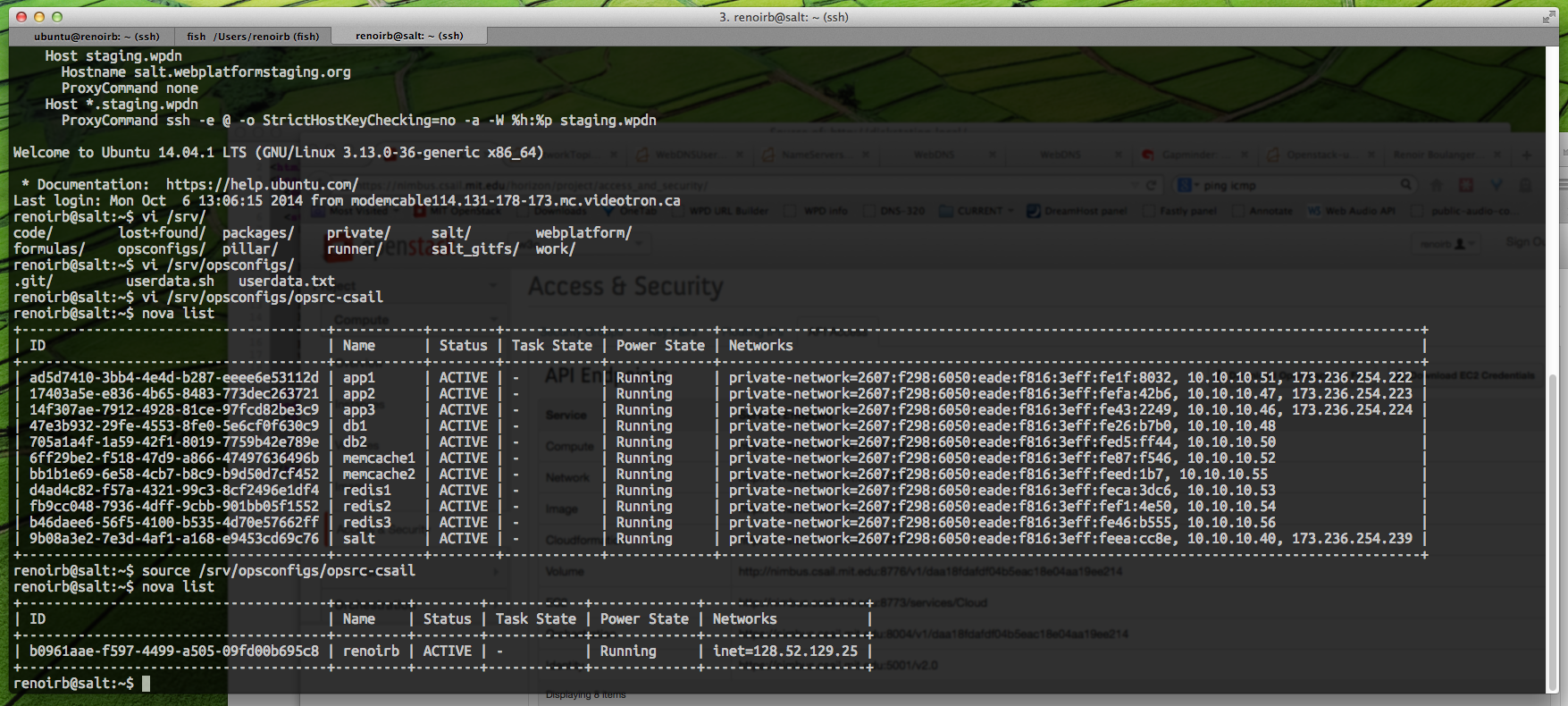It is possible the code shown here no longer works. This was written at the time before VMWare aquired SaltStack and maybe code shown uses parts of Salt Stack that no longer exists.
Add OpenStack instance meta-data info in your salt grains
linux operations salt-stack cloud-computing open-source - 📁 snippet

Open Stack NOVA client is leveraging an internal HTTP API to display data we can consume from the CLI. The present article shows how to add data from OpenStack into Salt Stack.
During a work session on my salt-states for WebPlatform.org I wanted to shape be able to query the OpenStack cluster meta-data so that I can adjust more efficiently my salt configuration.
What are grains? Grains are structured data that describes what a minion has such as which version of GNU/Linux its running, what are the network adapters, etc.
The following is a Python script that adds data in Salt Stack' internal database called grains.
I have to confess that I didn't write the script but adapted it to work within an OpenStack cluster. More precisely on DreamHost's DreamCompute cluster. The original script came from saltstack/salt-contrib and the original file was ec2_info.py to read data from EC2.
The original script wasn't getting any data in the cluster. Most likely due to API changes and that EC2 API exposes dynamic meta-data that the DreamCompute/OpenStack cluster don't.
The article’s source script is available on GitHub as a Python script we can insert into SaltStack as a grain
In the end, I edited the file to make it work on DreamCompute and also truncated some data that the grains subsystem already has.
My original objective was to get a list of security-groups the VM was
assigned. Unfortunately the API doesn't give that information yet. Hopefully
I'll find a way to get that information some day.
Get OpenStack instance detail using Salt
Locally
salt-call grains.get dreamcompute:uuid
local:
10a4f390-7c55-4dd3-0000-a00000000000
Or for another machine
salt app1 grains.get dreamcompute:uuid
app1:
510f5f24-217b-4fd2-0000-f00000000000
What size did we create a particular VM?
salt app1 grains.get dreamcompute:instance_type
app1:
lightspeed
What data you can get
Here is a sample of the grain data that will be added to every salt minion you manage.
You might notice that some data will be repeated such as the 'hostname', but the rest can be very useful if you want to use the data within your configuration manag
dreamcompute:
----------
availability_zone:
iad-1
block_device_mapping:
----------
ami:
vda
ebs0:
/dev/vdb
ebs1:
vda
root:
/dev/vda
hostname:
salt.novalocal
instance_action:
none
instance_id:
i-00000000
instance_type:
lightspeed
launch_index:
0
local_ipv4:
10.10.10.11
name:
salt
network_config:
----------
content_path:
/content/0000
name:
network_config
placement:
----------
availability_zone:
iad-1
public_ipv4:
203.0.113.11
public_keys:
----------
someuser:
ssh-rsa ...an rsa public key... someuser-comment@example.org
ramdisk_id:
None
reservation_id:
r-33333333
security-groups:
None
uuid:
10a4f390-7c55-4dd3-0000-a00000000000
What does the script do?
The script basically scrapes OpenStack meta-data service and serializes into saltstack grains system the data it gets.
OpenStack's meta-data service is similar to what you'd get from AWS, but doesn't expose exactly the same data. This is why I had to adapt the original script.
To get data from an instance you simply (really!) need to make an HTTP call to
an internal IP address that OpenStack nova answers. (that’s what the IPv4
address starting by 169. is)
For example, from an AWS/OpenStack VM, you can know the instance hostname by doing
curl http://169.254.169.254/latest/meta-data/hostname
salt.novalocal
To know what the script calls, you can add a line at _call_aws(url)
method (lines 32-34), like so;
diff --git a/_grains/dreamcompute.py b/_grains/dreamcompute.py
index 682235d..c3af659 100644
--- a/_grains/dreamcompute.py
+++ b/_grains/dreamcompute.py
@@ -25,6 +25,7 @@ def _call_aws(url):
"""
conn = httplib.HTTPConnection("169.254.169.254", 80, timeout=1)
+ LOG.info('API call to ' + url )
conn.request('GET', url)
return conn.getresponse()
When you saltutil.sync_all (i.e. refresh grains and other data), the log will
tell you which endpoints it queried.
In my case they were:
[INFO ] API call to /openstack/2012-08-10/meta_data.json
[INFO ] API call to /latest/meta-data/
[INFO ] API call to /latest/meta-data/block-device-mapping/
[INFO ] API call to /latest/meta-data/block-device-mapping/ami
[INFO ] API call to /latest/meta-data/block-device-mapping/ebs0
[INFO ] API call to /latest/meta-data/block-device-mapping/ebs1
[INFO ] API call to /latest/meta-data/block-device-mapping/root
[INFO ] API call to /latest/meta-data/hostname
[INFO ] API call to /latest/meta-data/instance-action
[INFO ] API call to /latest/meta-data/instance-id
[INFO ] API call to /latest/meta-data/instance-type
[INFO ] API call to /latest/meta-data/local-ipv4
[INFO ] API call to /latest/meta-data/placement/
[INFO ] API call to /latest/meta-data/placement/availability-zone
[INFO ] API call to /latest/meta-data/public-ipv4
[INFO ] API call to /latest/meta-data/ramdisk-id
[INFO ] API call to /latest/meta-data/reservation-id
[INFO ] API call to /latest/meta-data/security-groups
[INFO ] API call to /openstack/2012-08-10/meta_data.json
[INFO ] API call to /latest/meta-data/
[INFO ] API call to /latest/meta-data/block-device-mapping/
[INFO ] API call to /latest/meta-data/block-device-mapping/ami
[INFO ] API call to /latest/meta-data/block-device-mapping/ebs0
[INFO ] API call to /latest/meta-data/block-device-mapping/ebs1
[INFO ] API call to /latest/meta-data/block-device-mapping/root
[INFO ] API call to /latest/meta-data/hostname
[INFO ] API call to /latest/meta-data/instance-action
[INFO ] API call to /latest/meta-data/instance-id
[INFO ] API call to /latest/meta-data/instance-type
[INFO ] API call to /latest/meta-data/local-ipv4
[INFO ] API call to /latest/meta-data/placement/
[INFO ] API call to /latest/meta-data/placement/availability-zone
[INFO ] API call to /latest/meta-data/public-ipv4
[INFO ] API call to /latest/meta-data/ramdisk-id
[INFO ] API call to /latest/meta-data/reservation-id
[INFO ] API call to /latest/meta-data/security-groups
Its quite heavy.
Hopefully the script respects HTTP headers and don't bypass 304 Not Modified
responses. Otherwise it'll add load to nova. Maybe I should check that
(note-to-self).
Install
You can add this feature by adding a file in your salt states repository in the
_grains/ folder. The file can have any name ending by .py.
You can grab the grain python code in this gist.